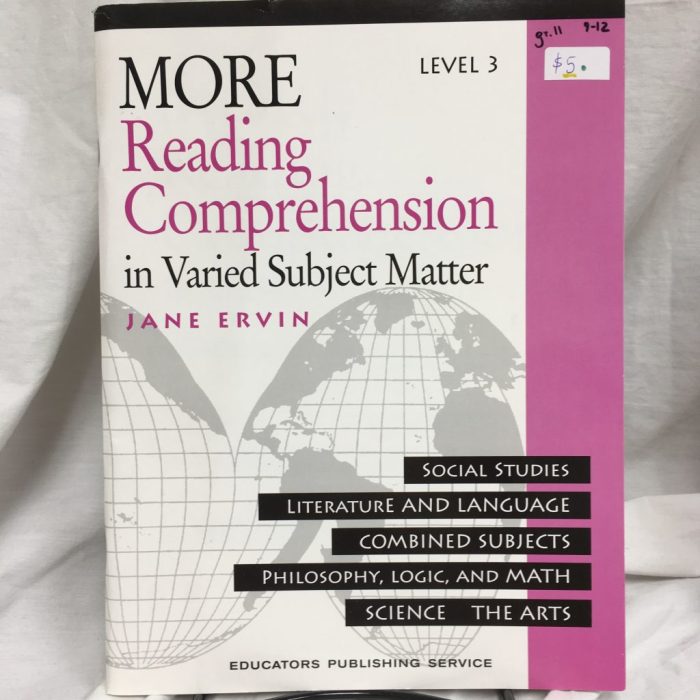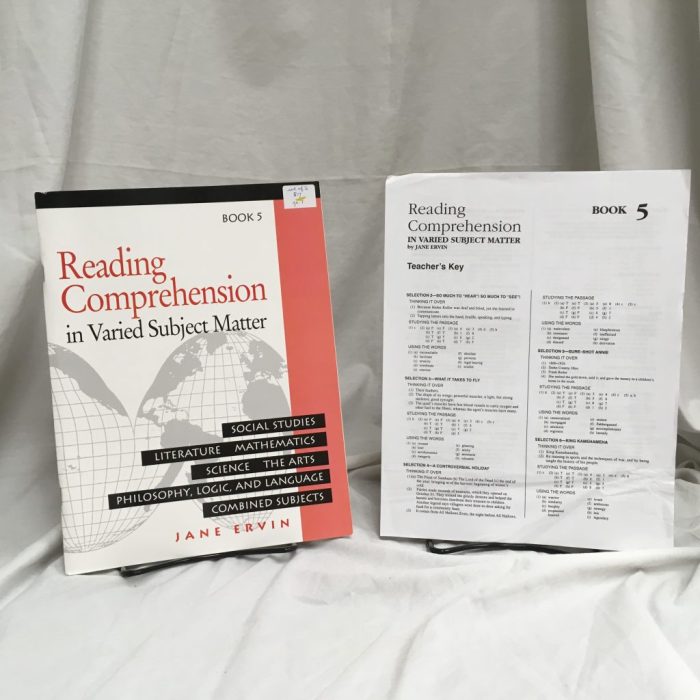Reading comprehension in varied subject matter presents unique challenges and opportunities. This comprehensive guide explores the cognitive processes involved, effective strategies, and the role of text complexity, vocabulary, and background knowledge. By understanding these factors, educators can empower students to become proficient readers across all disciplines.
From assessing reading comprehension to building background knowledge, this guide provides practical strategies and insights to enhance students’ reading skills in any subject area.
Reading Comprehension Strategies

Reading comprehension involves a complex set of cognitive processes, including decoding, understanding vocabulary, making inferences, and integrating new information with prior knowledge. Effective reading comprehension strategies help readers decode text, construct meaning, and apply their understanding to new situations.
Types of Reading Comprehension Strategies
*
- *Cognitive strategies focus on the mental processes involved in reading, such as activating prior knowledge, making predictions, and monitoring comprehension.
- *Metacognitive strategies help readers become aware of their own comprehension processes and take steps to improve their understanding.
- *Affective strategies involve the reader’s emotions and motivation, such as setting goals, maintaining focus, and overcoming obstacles.
Text Complexity and Reading Comprehension
Text complexity refers to the difficulty of a text, which can vary depending on factors such as vocabulary, sentence structure, and organization. Text complexity affects reading comprehension by influencing the reader’s ability to decode, understand, and apply the text’s content.
Strategies for Addressing Text Complexity
*
- *Scaffolding provides support for readers by breaking down complex text into smaller chunks, providing background information, and using visuals to aid understanding.
- *Chunking involves dividing text into manageable sections, which can improve comprehension and reduce cognitive load.
- *Tiered instruction provides different levels of support to readers based on their individual needs, ensuring that all students can access and understand the text.
Vocabulary and Reading Comprehension
Vocabulary is a critical component of reading comprehension. A strong vocabulary allows readers to decode words, understand concepts, and make connections between words and ideas.
Strategies for Teaching Vocabulary, Reading comprehension in varied subject matter
*
- *Contextual learning teaches vocabulary within the context of reading, helping students to make meaningful connections between words and their meanings.
- *Explicit instruction provides direct instruction on vocabulary words, including their definitions, parts of speech, and usage.
- *Word walls display vocabulary words in a visible location, reinforcing their meaning and encouraging repeated exposure.
Background Knowledge and Reading Comprehension: Reading Comprehension In Varied Subject Matter

Background knowledge plays a crucial role in reading comprehension, as it helps readers connect new information to their existing knowledge and experiences.
Strategies for Activating and Building Background Knowledge
*
- *Pre-reading activities engage students in discussions, brainstorming, or visual aids to activate prior knowledge before reading.
- *Text annotations encourage readers to make notes, highlight key points, and draw connections to their own experiences while reading.
- *Post-reading activities facilitate reflection, discussion, and further research to deepen understanding and build background knowledge.
Reading Comprehension Assessment
Reading comprehension assessments are essential for monitoring student progress and identifying areas of need.
Types of Reading Comprehension Assessments
*
- *Formal assessments are standardized tests or district-wide assessments that measure reading comprehension skills and abilities.
- *Informal assessments are teacher-created or classroom-based assessments that provide ongoing feedback on students’ reading comprehension.
- *Performance assessments evaluate students’ ability to apply reading comprehension skills in authentic situations, such as writing, speaking, or solving problems.
Query Resolution
What is the role of background knowledge in reading comprehension?
Background knowledge provides a foundation for understanding new information by connecting it to existing schemas.
How can educators assess reading comprehension in different subject areas?
Assessment methods vary depending on the subject matter and may include comprehension questions, summaries, and discussions.